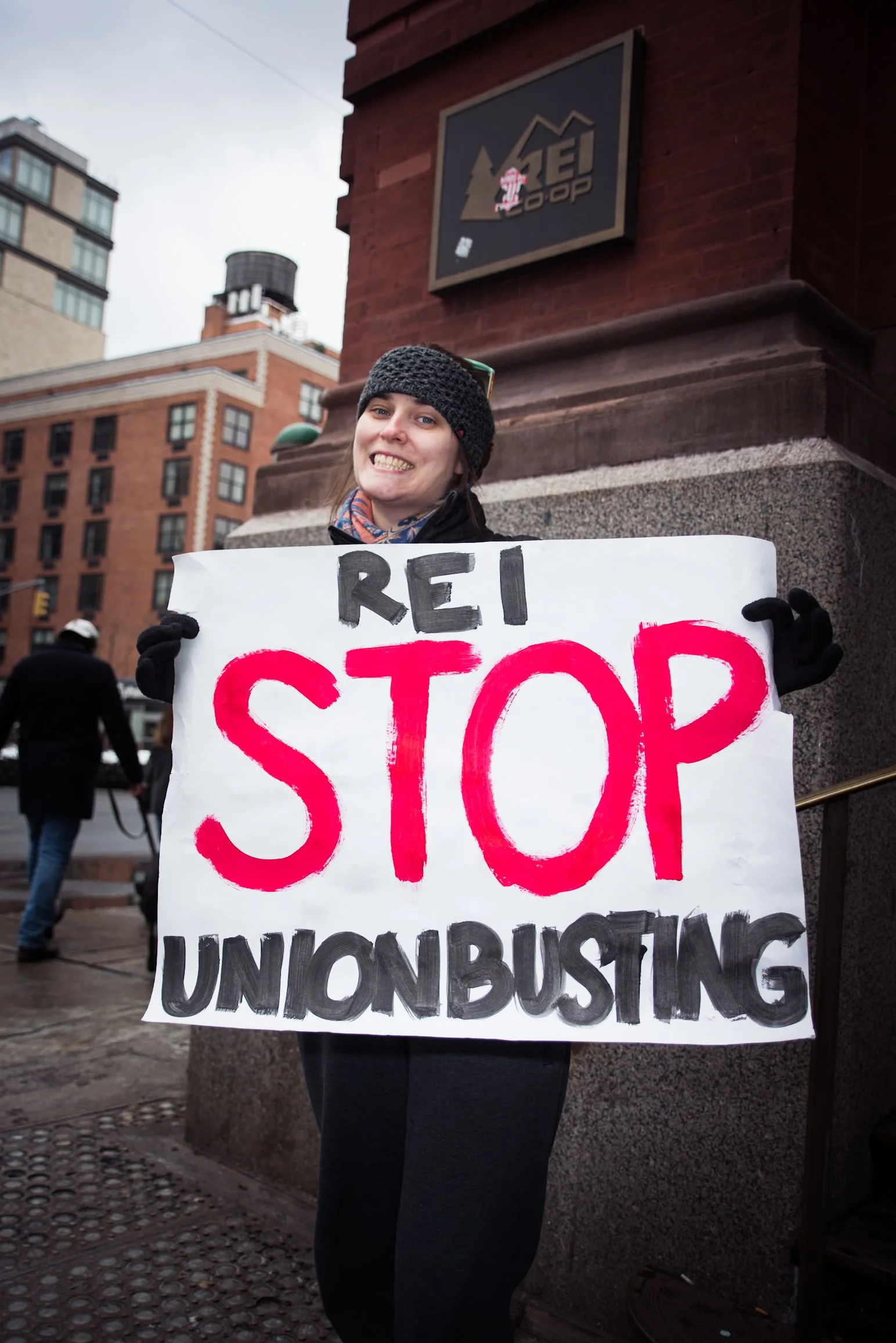REI Workers Set the Stage For a Theatrical Showdown in Soho…
REI workers in search of a first contract show union solidarity outside the company’s flagship store in Soho. Foot Wears House is their story of struggle. Photo courtesy of RWDSU.
By Joe Maniscalco
Union-busting companies know how to deal with walkouts, sickouts, boycotts — and even limited strikes — pretty handily under existing labor law. But how in the world do they confront a theatrical production that puts their exploitation and worker abuses center stage?
How do they contend with art?
New Yorkers are gonna find out very shortly how the bosses at REI’s flagship store in Soho deal with it because the green vests there are developing a new play in conjunction with the Working Theater aimed at an eventual Off-Broadway production — and it dramatizes the workers’ ongoing fight to secure a first contract — as it happens.
“I knew I was gonna write a play about my day job — but I thought it was gonna be a comedy about greenwashing or actors having day jobs, something a little bit lighter than what I ended up with,” Foot Wears House playwright Laura Neill tells Work-Bites. “When I was hired, I was told REI is unionized. I was like, ‘Oh, great, this is amazing; I love being part of the unionized workforce.’”
Playwright Laura Neill and REI co-workers perform an excerpt of Foot Wears House at Solas Bar earlier this week. Photo by Joe Maniscalco
As such, Neill anticipated a good contract with solid union protections would soon follow.
“And then I realized, of course, that REI is not bargaining in good faith at all,” she says. “And so, this play came out of that.”
Neill and some of her REI co-workers performed an excerpt of Foot Wears House at a special Working Theater showcase held earlier this week in Manhattan. A full reading of the developing production is slated for Saturday, February 24, at the Hudson Park Library. The event is free and starts at 2 p.m.
REI management is on record saying it doesn’t believe “union representation is the best path to improving work situations for REI employees” and that it is instead committed to “creating an employee experience that is so compelling that the need for union is not necessary.”
Cue the violins.
All that might be somewhat more convincing if literally every other company out there bent on preventing their employees from unionizing didn’t mouth a variation of the exact same kind of rhetoric.
Last May, the purportedly progressive company specializing in woodsy outdoor gear ditched its legal team roughly a year into contract negotiations with workers and hired Morgan Lewis — an outfit the New York City Central Labor Council calls a “vehemently anti-union law firm.”
Carlos Angel-Barajas and an REI co-worker pause during the union walkout held on Feb. 17. Photo by Neil Caughlan.
Neill and her co-workers insist REI is, indeed, stonewalling contract talks. After all, they organized with RWDSU — the Retail, Wholesale and Department Store Union — nearly two whole years ago. This past weekend, they walked out in protest of the company’s ongoing foot-dragging and its decision to deny raises to workers at its unionized stores.
“Which is a huge violation and completely illegal,” Neill says. “Starbucks has already gotten in trouble [for that], and now REI is gonna go ahead and get in trouble for it, too.”
Further job actions could soon follow.
"This play, written by REI workers, presents the daunting challenges workers face from their employer’s resistance as they try to achieve a first contract,” RWDSU President Stuart Appelbaum tells Work-Bites. “The workers express themselves through this play to highlight the company’s needlessly lengthy and combative anti-union animus. The play may be fiction — but the reality is much worse as workers struggle for their rights.”
Actor Carlos Angel-Barajas works alongside Neill at REI and is also part of the Foot Wears House cast. He was already on the job when Neill came aboard last year, and calls his co-workers “amazing, brave, and empathetic people” more than willing to strike on each other’s behalf.
Playwright Laura Neill on the Feb. 17 picket line. Photo by Neil Caughlan
“I see this play as one of the more pure expressions of art,” he says. “You live a life full of struggles, joys, and fears — and then your job as an artist is to report back to everyone what that felt like. And that's kind of what is happening here.”
From Waiting for Lefty to The Cradle Will Rock, working class dramas and stirring depictions of the labor movement have left an indelible mark on American theater — even if Broadway nowadays leans heavily on feel good musicals.
The Cradle Will Rock upset the status quo so much back in 1937, that federal authorities actually shut down its New York City premiere at the Federal Theater. The crackdown sent undaunted producer John Houseman and director Orson Welles scrambling to find another venue to stage the performance across town — that same night.
In 2017, playwright Lynn Nottage won the Pulizer-Prize for Sweat — her emotionally powerful story of working class men and women left devastated in the economically-ravaged city of Reading, Pennsylvania.
“The Working Theater is returning theater to the American Labor movement,” Artistic Director and Foot Wears House helmer Colm Summers declared this week in Manhattan.
“My belief in this work as an action — and in this reading as an action that can help our cause — that started coming when I was a little bit into the draft,” Neill says. “I’d get off a horrible shift, go home, and just let all of that pour out on paper, showing the juxtaposition between the terrible working conditions and the power of my co workers, and just the camaraderie that we have with each other.”
According to Neill, it all felt very seamless.
“And it feels very natural that this play helped the union cause — because it wouldn't exist without the union cause — it’s always been woven in,” she says.
By the way, New York City municipal retirees leading the charge against the ongoing campaign to strip 250,000 former city workers of their traditional Medicare benefits and push them into a profit-driven Medicare Advance system have also used creative street theater to great effect in their courageous fight against privatization.
“I think labor and the arts naturally intersect with each other,” adds Neill.
Angel-Barajas says he’d like to see the “artistic community at large” sit up and take better notice of what is happening inside the labor movement today.
“These are compelling stories,” he says. “Come tell these stories. If you’re a filmmaker, if you're a director — hey, if you’re Greta Gerwig — come tell a story about a union, you know?”
Editor’s Note: Greta Gerwig’s latest move “Barbie” has grossed more than $1.4 billion at the box office worldwide.
“The labor movement right now is really impressive,” says Neill. “We’re having conversations with our fellow workers at Trader Joe’s, Barnes & Noble, Nighthawk [Cinema]. We're in conversation with each other and showing up for each other. I think that's the most powerful thing that we can do.”
Appelbaum’s message to the bosses before curtain call?
“It’s long past time that REI gets serious about negotiating and getting to a first contract,” he says.
The Hudson Park Library is located at 66 Leroy Street in Manhattan.




